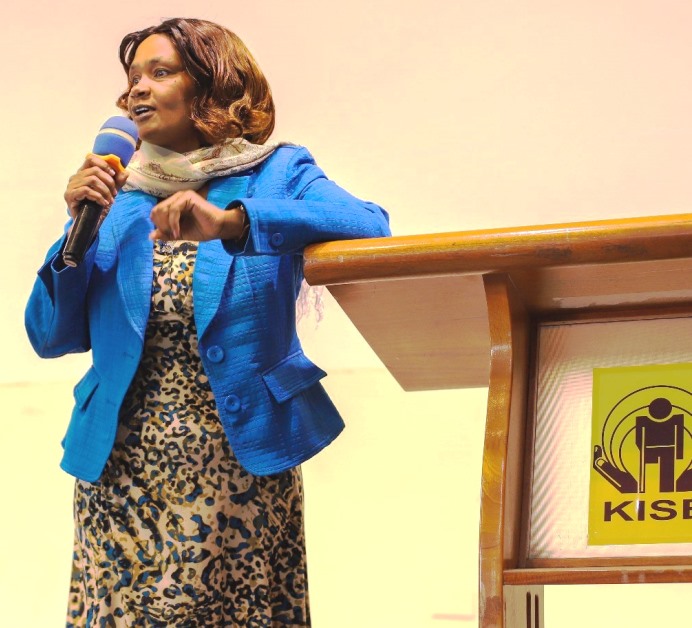Chief guest Principal Secretary Esther Muoria, while addressing the over 300 representatives from the Nairobi region of the institutions, emphasized the implementation of the modular program so that young men and women in the country can acquire skills in the shortest time possible to be certified and enter the job market.
Muoria said that TVETs should have workshops rather than classrooms, as they are intended to offer practical skills rather than theoretical knowledge.
ALSO READ:
TSC field officers urge incoming CEO to restore motivation, support
“In September 2023, full adoption of the CBET curriculum was directed across all public TVET institutions. Thereafter, Occupational Standards were harmonized by June 2024, culminating in the approval of all standards and aligned CBET curricula by the TVET Authority in December 2024. These standards were developed collaboratively with industry players to ensure alignment with current and emerging labour market demands,” she said.
Over 66,000 students have been enrolled in a modular program within different TVET institutions in the region since the May intake.
“Under the modularized curriculum, training is anchored on the Know–Understand–Do philosophy, emphasizing the mastery of competencies aligned to specific skills. A guiding philosophy now gaining ground within the TVET sector affirms that “Theory is practically useless if there is nothing you can do with it.” This transition addresses the long-standing mismatch between the qualifications acquired by graduates and the practical demands of industry,” she said.
ALSO READ:
HELB to partner with law enforcement agencies to track loan defaulters
Muoria stated that a target has been set for enrolling two million trainees by December 2025, reinforcing a commitment to inclusive growth and empowerment through skills development.
She said that the Curriculum reforms undertaken under the leadership of the State Department have shifted the focus from theory-intensive instruction to practical, outcome-based training.
To increase flexibility and accelerate skills acquisition, 192 CBET curricula have been modularised. The modular curriculum enables trainees to complete defined skill sets progressively, allowing for both vertical and horizontal mobility within the labour market.
She stated that, beginning in May 2025, the modular curriculum was implemented across all TVET institutions. Entry-level modules can now be completed within three to six months, while full qualifications may span up to two years, depending on the skill level and industry requirements.
ALSO READ:
All Bamachoge Chache students to get bursaries on applying, MP assures
Muoria said monitoring of the implementation process will commence next month and will assess delivery efficiency, compliance with module sequencing and actualisation of competencies among trainees. Institutions have been directed to transition all ongoing students to the modular system.
In addition, those pursuing KNEC curricula are to be supported through CBET bridging opportunities, offered on part-time or blended modalities, to ease the academic transition and reinforce employability.
She stated that the reformed approach necessitates the acquisition of practical skills not only within institutional workshops but also in real-world industry settings.
“Industry actors are therefore expected to play a central role in offering structured training opportunities and also in participating in the assessment of trainees to ensure alignment with occupational and sector-specific standards. This partnership is essential for producing graduates whose competencies are directly applicable in the workplace, thereby bridging the gap between training and employment,” she said.
ALSO READ:
MoE unveils an online platform for the Grade 9 placement to senior school process
She said that testimonies from members of the Kenyan diaspora confirmed that technical certificates alone are insufficient unless accompanied by competency, precision, finesse, work ethic, and attitude.
“As affirmed by one member of the diaspora, ‘If you are good, you will be traced.’ This testimonial reinforces the necessity for Kenyan training systems to not only pass knowledge to trainees, but to skill them and nurture workplace excellence pragmatically,” she said.
She said the Recognition of Prior Learning (RPL) framework is being implemented through a dedicated Division within the State Department.
“Through RPL, skilled individuals, particularly those trained through informal or non-formal means, are provided with pathways to validate and certify their competencies. This mechanism enhances inclusivity and strengthens recognition of skills within the informal sector, which accounts for over 80 per cent of national employment. By formally acknowledging existing competencies, RPL further supports labour market mobility and social equity within the CBET system,” she said.
ALSO READ:
Over 1,000 Grade 9 students attend inaugural career pathways fair in Mombasa
She, however, said that Principals, Deputy Principals, and Heads of Department are expected to drive awareness, provide technical guidance to trainers, and ensure compliance with the new curriculum framework.
“When institutional leaders demonstrate clarity of purpose, consistency in communication and visible commitment to reform, confidence is instilled across all levels of the training ecosystem. Trainees will transition to the new system smoothly when guided by informed and motivated faculty. Parents and guardians, and the society in turn, develop greater trust in the value and credibility of TVET programs,” she said.






